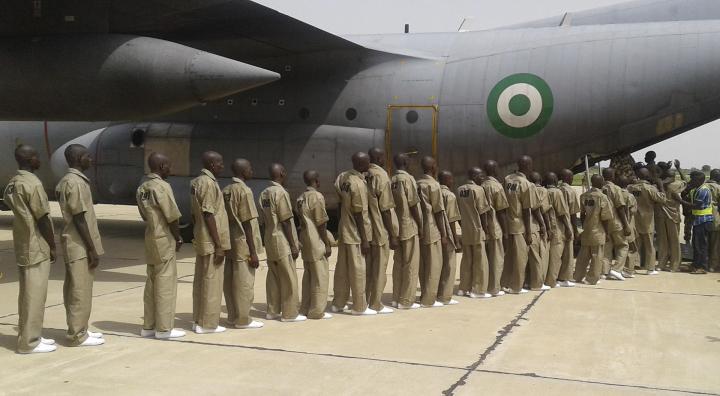ISS TODAY
Understanding the dangerous journey from Boko Haram to rehabilitation

As former terrorists move from surrender to disarmament and reintegration, each step must be catered for.
First published by ISS Today
Military operations in the Lake Chad Basin have contributed to the surrender of low- and mid-level Boko Haram militants, Institute for Security Studies (ISS) research has found. The recent surge in military strikes after Chad’s Operation Boma Wrath in mid-April and the relocation of Nigeria’s army head General Tukur Yusuf Buratai to the north-east could mean even more surrenders.
Military action has limited Boko Haram’s access to important supplies, taken its toll psychologically on members, and worsened living conditions for terrorists and civilians in affected areas. All this encourages extremists to disengage from the group.
Ex-combatants refers to fighters and mid-level commanders, while ex-associates are those trapped or willingly staying in Boko Haram occupied areas to provide logistical support to the group. Most ex-associates interviewed by the ISS across all Lake Chad Basin countries claimed membership of the Boko Haram faction led by Abubakar Shekau – Jama’atu Ahlis Sunna Lidda’awati wal-Jihad.
Regardless of their affiliation though, individual journeys from disengagement to rehabilitation are often fraught with uncertainty. Disarmament, demobilisation, rehabilitation and reintegration can help stabilise the Lake Chad Basin region, but will require a deeper understanding of how individuals engage within specific phases of the process.
Reasons for leaving Boko Haram are complex and personal – driven by different stories of circumstance, survival and desperation. Besides military pressure, ex-associates say they are disillusioned with Boko Haram because of its brutality and internal rivalries, without necessarily disavowing the group’s ideology.
Many female ex-associates leave because of their deplorable living conditions, or because their spouses have died. Although many claim they were forced to join, there are also voluntary recruits. Several are encouraged to become suicide bombers, or to remarry after divorce or the death of a spouse. Refusing these options could result in detention and retribution. The offer by some Lake Chad Basin countries to surrender into rehabilitation provides an escape.
The dangerous journey from Boko Haram to rehabilitation requires patience, sound planning and execution. Failed escapes are mostly punishable by death, so former associates seek options that ensure due process, safety and reintegration.
In north-eastern Nigeria, the epicentre of the Boko Haram crisis, ongoing research identifies three main pathways to disengagement – surrender, surreptitious return to communities undetected by security forces, and blending in with fleeing civilians. Those in the last two categories remain concealed for fear of being killed by security agents if they surrender or reveal their roles in Boko Haram.
In Cameroon, Chad and Niger, ex-Boko Haram associates have used their families and community gatekeepers as conduits into administrative custody. Gatekeepers are local watch committees in Niger, vigilance committees in Cameroon, and traditional and administrative authorities in Chad. They hand over former associates to authorities for screening and processing.
On the journey from desertion to rehabilitation, this is the point where individuals enter an indefinite holding pattern. Security forces don’t always inform ex-associates of their rights and responsibilities, or what awaits them, and many think they’ll be executed.
In Nigeria, those entering rehabilitation through Operation Safe Corridor pass through Giwa Barracks, the screening and holding facility in Borno State managed by the Joint Investigation Committee. The committee comprises investigators and prosecutors, and determines people’s eligibility for deradicalisation, rehabilitation and reintegration.
Here high-risk members, including senior commanders, are sent to a pre-trial detention centre. Moderates, including foot soldiers and mid-level commanders, go to Operation Safe Corridor for reintegration. Most civilians arrested during military operations who are proven innocent are released to the state for rehabilitation.
Interviewees told the ISS that conditions at Giwa Barracks made them lose hope and regret surrendering. This claim is contested by the Nigerian military, who point to the many people who continue to surrender daily.
The safety and experiences of ex-associates varies, which is unsurprising given the complexity and variety of programmes operating. Operation Safe Corridor is a multi-sectoral programme involving 17 government agencies administering specific projects. It is federally run and mainly offers safe passage and rehabilitation for male Boko Haram members who surrender.
The Borno State-run Bulunkutu Rehabilitation Centre caters for women and children, but not at the same level of organisation, infrastructure and attention given to Operation Safe Corridor. The Shukuri transit camp in Maiduguri takes in Operation Safe Corridor graduates. In Niger, the Goudoumaria camp graduated its first batch of surrendered ex-Boko Haram associates – both male and female – in December 2019. Rehabilitation programmes are still pending in Cameroon and Chad.
Ex-Boko Haram associates say uncertainty at the point of screening and processing point fuels discontent and fear, preventing others from leaving the group. To make matters worse, their testimonies of human rights violations fuel recruitment into the extremist group.
Rehabilitation also needs to provide for the specific roles that women play in Boko Haram. Only 10 of the over 800 people associated with the group who have gone through Operation Safe Corridor are women. Children in the Lake Chad Basin region are also exposed to violence and sometimes forcibly recruited to commit attacks. The lack of adequate responses for the rehabilitation of juveniles is also a concern.
If encouraging combatants and associates to leave Boko Haram is a strategy to help stabilise the region, the various steps on the journey from disengagement to reintegration must be taken seriously. This will require paying more attention to the screening and processing stages, as well as providing programmes tailored for women and juveniles. DM
Fonteh Akum is Programme Head, and Malik Samuel, researcher, ISS Regional Office for West Africa, the Sahel and the Lake Chad Basin.


















